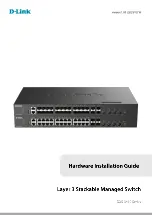
AS Series User Manual
95
Doc No.: AS5-0116-01
server. The 6-byte MAC address is converted to a string on the following form
"xx-xx-xx-xx-xx-xx", that is, a dash (-) is used as separator between the lower-
cased hexadecimal digits. The switch only supports the MD5-Challenge
authentication method, so the RADIUS server must be configured accordingly.
When authentication is complete, the RADIUS server sends a success or failure
indication, which in turn causes the switch to open up or block traffic for that
particular client, using the Port Security module. Only then will frames from
the client be forwarded on the switch. There are no EAPOL frames involved in
this authentication, and therefore, MAC-based Authentication has nothing to
do with the 802.1X standard.
The advantage of MAC-based authentication over port-based 802.1X is that
several clients can be connected to the same port (e.g. through a 3rd party
switch or a hub) and still require individual authentication, and that the clients
don't need special supplicant software to authenticate. The advantage of
MAC-based authentication over 802.1X-based authentication is that the clients
don't need special supplicant software to authenticate. The disadvantage is
that MAC addresses can be spoofed by malicious users - equipment whose
MAC address is a valid RADIUS user can be used by anyone. Also, only the
MD5-Challenge method is supported. The maximum number of clients that
can be attached to a port can be limited using the Port Security Limit Control
functionality.
RADIUS-Assigned
QoS Enabled
When RADIUS-Assigned QoS is both globally enabled and enabled (checked) on
a given port, the switch reacts to QoS Class information carried in the RADIUS
Access-Accept packet transmitted by the RADIUS server when a supplicant is
successfully authenticated. If present and valid, traffic received on the
supplicant's port will be classified to the given QoS Class. If (re-)authentication
fails or the RADIUS Access-Accept packet no longer carries a QoS Class or it's
invalid, or the supplicant is otherwise no longer present on the port, the port's
QoS Class is immediately reverted to the original QoS Class (which may be
changed by the administrator in the meanwhile without affecting the RADIUS-
assigned). This option is only available for single-client modes, i.e.
• Port-based 802.1X
• Single 802.1X
RADIUS attributes used in identifying a QoS Class:
Refer to the written documentation for a description of the RADIUS attributes
needed in order to successfully identify a QoS Class. The User-Priority-Table
attribute defined in RFC4675 forms the basis for identifying the QoS Class in an
Access-Accept packet. Only the first occurrence of the attribute in the packet
will be considered, and to be valid, it must follow this rule: All 8 octets in the
attribute's value must be identical and consist of ASCII characters in the range
Summary of Contents for AS5010-P
Page 40: ...AS Series User Manual 39 Doc No AS5 0116 01 values...
Page 69: ...AS Series User Manual 68 Doc No AS5 0116 01 values...
Page 85: ...AS Series User Manual 84 Doc No AS5 0116 01 event...
Page 103: ...AS Series User Manual 102 Doc No AS5 0116 01 values...
Page 136: ...AS Series User Manual 135 Doc No AS5 0116 01 Example MSTI Configuration...
Page 160: ...AS Series User Manual 159 Doc No AS5 0116 01...
Page 175: ...AS Series User Manual 174 Doc No AS5 0116 01 Fig LLDP MED Configuration...
Page 192: ...AS Series User Manual 191 Doc No AS5 0116 01 values...
Page 199: ...AS Series User Manual 198 Doc No AS5 0116 01 member of all possible VLANs...
Page 213: ...AS Series User Manual 212 Doc No AS5 0116 01 Fig The IP Voice VLAN Configuration...
Page 224: ...AS Series User Manual 223 Doc No AS5 0116 01...
Page 228: ...AS Series User Manual 227 Doc No AS5 0116 01 Fig The Port Tag Remarking...
Page 237: ...AS Series User Manual 236 Doc No AS5 0116 01 Fig The DSCP Classification Configuration...
Page 240: ...AS Series User Manual 239 Doc No AS5 0116 01 Fig The QoS Control List Configuration...
Page 257: ...AS Series User Manual 256 Doc No AS5 0116 01 Fig The sFlow Configuration...
Page 401: ...AS Series User Manual 400 Doc No AS5 0116 01 default is 3...
Page 403: ...AS Series User Manual 402 Doc No AS5 0116 01 No Click to undo any restart action...
Page 415: ...AS Series User Manual 414 Doc No AS5 0116 01 Fig DMS Information Screen...
Page 418: ...AS Series User Manual 417 Doc No AS5 0116 01 Version Device firmware version...
Page 428: ...AS Series User Manual 427 Doc No AS5 0116 01 Fig the DMS Diagnostics Section...
















































